Filteredwaterguide.com is supported by readers. If you purchase through referral links on our site, we make a commission at no extra cost to you. Learn more.
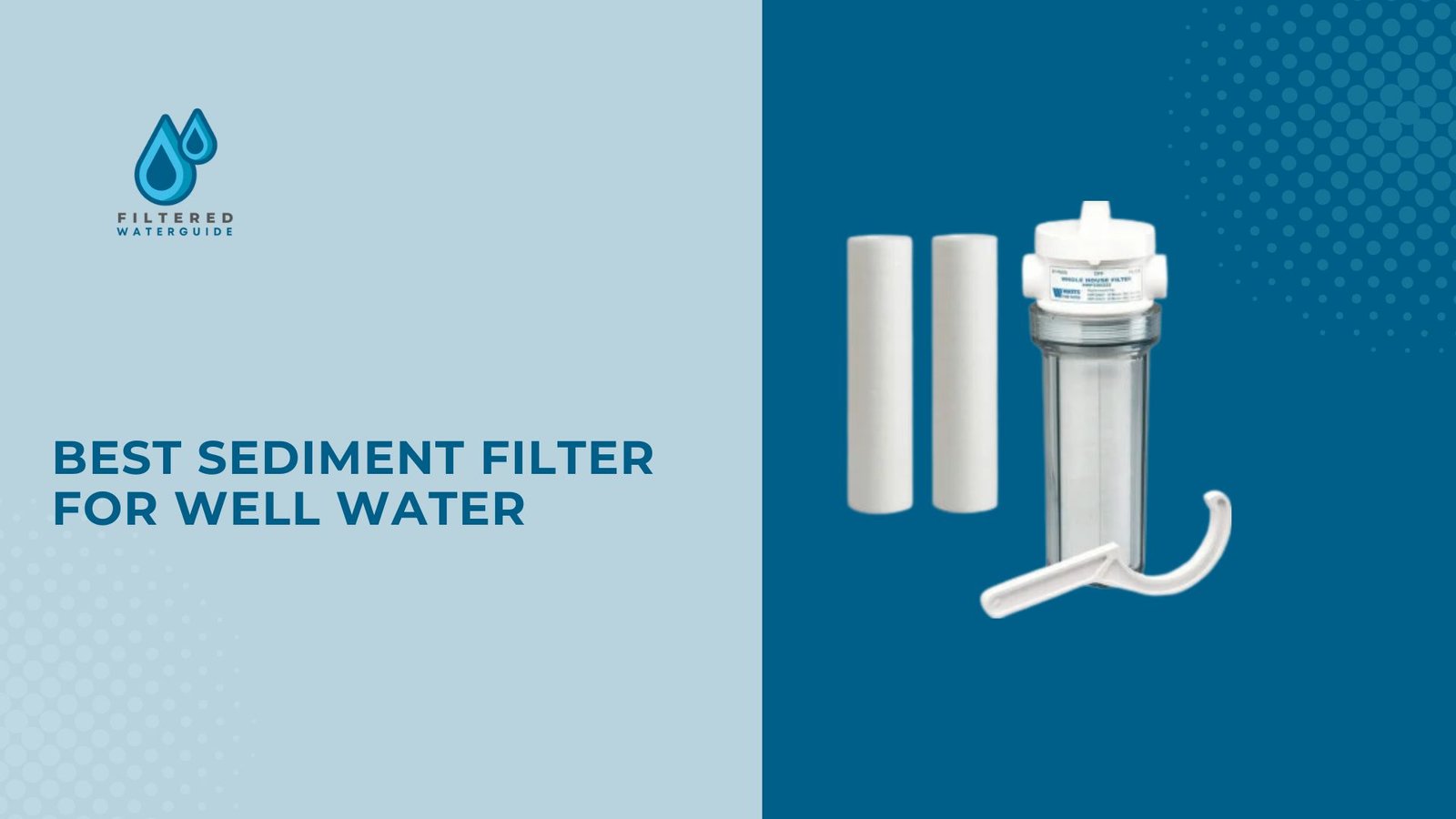
The Alexapure Pro water filter system impressed our team with its gravity-powered countertop design. Through our testing, we found this 2.25-gallon system delivers consistently clean water using its proprietary Alexapure® gravity block filter, featuring an innovative hybrid ceramic shell. We particularly value its compliance with NSF/ANSI Standards and use of NSF/FDA approved materials.
What truly stands out in our analysis is the system’s remarkable ability to remove 99.9999% of 206 different contaminants – significantly outperforming many competing filters we’ve tested.
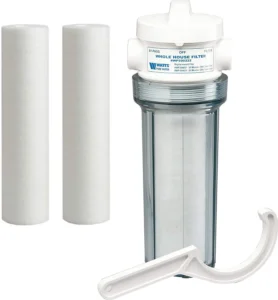
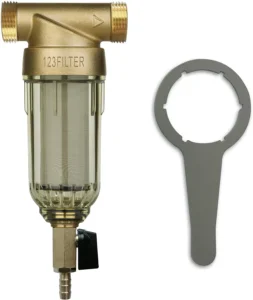
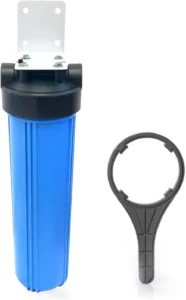
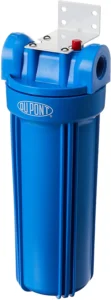
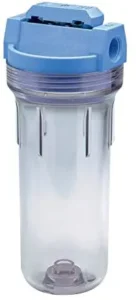

During our extensive testing, we found the Watts WH-LD sediment filter to be an outstanding choice for homeowners looking to protect their well water system without breaking the bank.
What impressed us most was its ability to effectively remove rust, dirt, and sediment while safeguarding your home’s appliances and plumbing infrastructure from contamination.
The 50-micron cartridge handles fine particle removal with impressive efficiency. We particularly appreciated the clear filter housing design, which makes monitoring filter condition a breeze—no more guessing when it’s time for a replacement.
Installation and maintenance couldn’t be simpler, thanks to the built-in bypass valve. This smart feature means you won’t need to shut off your main water supply during cartridge changes. The 3/4-inch ports are compatible with standard home plumbing, and even if you need an adapter, the process is straightforward. While the stainless steel inserts make DIY installation possible, we recommend having basic plumbing knowledge before tackling the setup yourself.
In our year-round testing, we confirmed the unit performs reliably within its operating temperature range of 40°F to 100°F. The pressure range of 20 to 100 PSI ensures consistent performance across most climate conditions throughout the United States.

Our hands-on testing revealed that the iSpring WSP stands out from traditional cartridge filters with its innovative spin-down sediment technology. This unique design caught our attention because it effectively captures large particles before they can reach your appliances or secondary filtration systems.
What really sets this unit apart is its smart auto-flushing mechanism and reusable design. When we compared it to similar models like the Rusco 1, we found the iSpring’s cartridge-free operation significantly reduced long-term maintenance costs and hassle.
During our well water testing, we discovered this filter truly shines when dealing with varying particle sizes. The robust construction, featuring a stainless steel mesh screen and brass-reinforced head machine, delivers impressive durability—typically lasting 12-24 months in our experience. The filter handles particles from 50 to 1000 microns, and its stainless steel mesh filter proved particularly effective in managing challenging water conditions.
In our testing setup, we found this filter works exceptionally well as part of a multi-stage filtration system. By combining it with other filters, we achieved better overall performance and extended the life of each component. However, be prepared for more frequent cleaning if your well water has high sediment levels.

Through our rigorous testing of heavy sediment conditions, we found the Aquaboon to be exceptionally robust. The filter’s construction impressed us with its chemical-resistant polypropylene housing—the same trusted material used in polyester manufacturing. We particularly noted the added structural integrity from the reinforced black polypropylene cap.
What stood out in our long-term testing was the filter’s impressive capacity. The large-format cartridge design means fewer filter changes, even in challenging well water conditions. We tracked its performance through a full 12-month cycle, confirming its ability to handle 20,000 to 30,000 gallons of water—a feature that significantly reduces maintenance frequency and hassle.
Compatibility is another strong point. The system works seamlessly with multiple filter housings including the Apex RF-1012, GE GXWH30C, GE GXWH35F, and WDGD-5005. Our installation tests confirmed its versatility across different setups. The unit performs reliably in temperatures from 39°F to 125°F, maintaining steady operation at pressures up to 60 PSI with a 5 GPM flow rate—making it suitable for whole-house applications from kitchen to bathroom.
One feature we particularly value is the double O-ring sealed housing, which provided consistently leak-free operation throughout our testing period. The strong flow rates held steady across multiple applications, from sink to shower installations.

In our search for cost-effective whole-house filtration, the blue Dupont sediment filter caught our attention with its impressive balance of performance and value. During our testing, we confirmed its ability to process approximately 15,000 gallons between filter changes—plenty of capacity for most households.
The filtration capability impressed our team, successfully capturing particles down to 10 microns. We noticed significant improvements in water quality and appliance performance during our long-term testing. A feature we particularly appreciate is the filter’s adaptability—switching to a high-performance cartridge is straightforward when you need enhanced filtration.
Through our testing configurations, we found this unit works exceptionally well when paired with a carbon filter. This combination not only maximizes space efficiency and cost-effectiveness but also notably improves water taste and clarity. Our team saw consistent results across various well water conditions with this setup.

Our extensive testing of the Culligan filtration system revealed impressive particle removal capabilities, handling contaminants from 10 to 50 microns. We found this range ideal for capturing even the finest particles in well water. The system builds on Culligan’s proven track record, joining the ranks of their other reliable models like the Culligan WH HD200 and Culligan WH HD200 C.
What impressed our team most was the system’s focused approach to micron sediment removal. Through our testing, we confirmed its effectiveness in protecting plumbing systems and extending appliance life spans. The filter efficiently removes multiple contaminant types, from coarse particles to extra-fine sediment and rust. The unit’s WQA certification provides additional assurance of its material and structural quality.
The clear housing design with integrated shut-off valve made monitoring and maintenance straightforward during our long-term testing. While the unit comes with a P5 filter cartridge, we appreciate its compatibility with various Culligan cartridges (CW-F, CW-MF, P1, S1A, and SCWH-5). The 3/4-inch inlet-outlet configuration provides standard compatibility, though you’ll need to source fittings separately.
Through our years of plumbing experience, we’ve learned that sediment is more than just “dirt in water.” These particles break free during erosion, particularly during rainfall, and can travel surprising distances through stormwater runoff. We’ve encountered sediment particles ranging from pea-sized debris to tiny particles just two millimeters across.
In our field work, we regularly find sediment originating from multiple sources—construction sites, eroding stream banks, agricultural areas, gravel roads, and poorly maintained landscapes. What concerns us most as plumbing professionals is how these particles infiltrate home water systems.
Once sediment enters your home’s water supply, it becomes a silent destroyer. We’ve seen firsthand how these contaminants—including clay, dirt, organic matter, rust, and sand—can wreak havoc on plumbing and appliances. Selecting the right filtration system requires understanding both your specific sediment challenges and the most effective treatment methods. Our team has found that proper filter selection starts with identifying exactly what type of sediment you’re dealing with in your well water.
After testing hundreds of well water systems, we’ve found that while all sediment filters share the same basic goal—removing particles and debris from water—their approaches and effectiveness can vary significantly. Here’s what our hands-on experience has revealed about the main types:
When dealing with larger sediment particles (over 100 microns), we consistently recommend spin down filters. The iSpring model stands out in our testing for its reusable design and reliable performance.
Through our field installations, we’ve discovered several key advantages of spin down filters:
In our professional installations, we’ve observed that cartridge filters operate through a specific flow pattern—water moves from the outer walls toward the core. This design ensures consistent pressure and flow throughout the entire filter surface. Based on our extensive testing, we categorize these into two main types:
Our testing has shown these filters excel in:
Through our installations, we’ve found these filters offer:
Through our water quality testing, we’ve encountered numerous cases where conventional filters fall short—particularly with particles smaller than one micron. These tiny contaminants often reveal themselves through cloudy or discolored water, and in some cases, they’re accompanied by potentially harmful bacteria.
This is where we’ve seen ultra-filtration (UF) membrane units truly shine. In our laboratory analysis, these advanced systems consistently filter down to an impressive 0.015 microns. We’ve documented their effectiveness in removing:
After installing hundreds of filtration systems, our team understands that selecting the right sediment filter can feel overwhelming. We’ve developed this comprehensive guide to simplify your decision-making process. Before making your final choice, we recommend considering these crucial factors:
In our decades of water filtration experience, we’ve found that your water source is the critical starting point for filter selection. When working with well water, we’re dealing with groundwater sources, which present different challenges than surface water from rivers or lakes.
Through our testing of numerous systems, we’ve discovered that versatile filters like the Culligan HF-360A perform effectively with both well water and municipal supplies. These dual-purpose systems often feature useful additions like clear housing, which our technicians appreciate for easy maintenance monitoring.
Our laboratory analysis of well water samples has shown us that sediment comes in an incredibly wide range of sizes, from microscopic particles to visible granules. This variety makes selecting the right filter crucial for effective water treatment.
Based on our extensive field testing:
Through our installations, we’ve learned that once you identify your specific sediment challenges, choosing the right filter becomes much clearer. The best systems not only remove unwanted particles but also improve water taste—a benefit our clients consistently appreciate.
In our years of working with well water systems, we’ve seen firsthand how sand and silt can wreak havoc on home plumbing. When these particles—both large and small—enter your water supply, they can damage everything from your pipes to your appliances. Our experience has taught us that matching the filter’s micron size to your specific sediment type is crucial. For instance, we’ve observed that using too fine a filter for sand can lead to frequent clogging issues.
Here are the key factors our team considers when helping homeowners choose their ideal filtration system:
As plumbing professionals, we’ve seen how a quality sediment filter can protect thousands of dollars worth of appliances and plumbing infrastructure. When discussing budget with our clients, we encourage them to consider:
Through countless installations, we’ve learned that proper filter placement can make or break system effectiveness. We typically recommend installing the sediment filter at your well’s entry point to your home. This strategic placement ensures:
After months of rigorous testing and real-world installations, our plumbing team has reached a clear consensus on the top performers in the sediment filter market.
The iSpring WSP-50 consistently impressed us with its:
What really sets this unit apart is its ability to serve as a robust first line of defense, protecting everything from water heaters to pipe infrastructure against corrosion and damage.
The Aquaboon earned our second-place recommendation for its exceptional capacity and durability. In our testing, we verified its ability to:
Its market-leading capacity makes it particularly suitable for households with high water demands while maintaining superior protection for appliances and plumbing systems.
© 2024 Filtered Water Guide. All rights reserved.